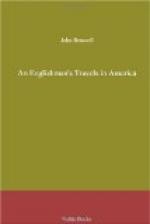Another drawback I had nearly forgotten, and as it serves to illustrate steam-boat and indeed all other travelling inconveniences in America, I must not pass it over; I refer to the vulgarity of the men passengers, who, in default of better occupation, chew tobacco incessantly, and, to the great annoyance of those who do not practise the vandalism, eject the impregnated saliva over everything under foot. The deck of the vessel was much defaced by the noxious stains; and even in converse with ladies the unmannerly fellows expectorated without sense of decency. The ladies, however, seemed not to regard it, and one bright-eyed houri I saw looking into the face of a long sallow-visaged young man, who had the juice oozing out at each angle of his mouth with disgusting effect, so that enunciation was difficult.
Some miles up the Hudson, on a high piece of table-land, amidst romantic scenery, stands in prominent relief the military college of West Point. It commands an extensive view, and, was, I believe, an important outpost during the late war. The young graduates were exercising in parties on the parade ground under officers, and appeared dressed in dark jackets with silver-coloured buttons, and light blue trowsers. We saw the targets used by the graduates in artillery, who practise on the river banks; at least, it was so stated by a fellow-passenger, who either was, or pretended to be, acquainted with all the affairs of that college.
Beneath the summit of a high bluff, covered with wood, contiguous to the college, I observed a monument or obelisk, which I ascertained to have been erected to the memory of Kosciusko, a Polish patriot, who took a prominent part in the annihilation of British rule in America. It had a very picturesque effect, and was regarded with feelings of veneration by many of the American passengers, one of whom paid a tribute to the departed hero, which he wound up by observing with nasal emphasis and lugubrious countenance, “If twarnt for that ere man, wher’d we be, I waunt to know; not here I guess.” This sentiment, although I could scarcely see the point of it myself, elicited half-a-dozen “do tells” and “I waunt to knows” from those around; expressions which, foolish as they sound to English ears, are in common use in the northern and eastern states, when an individual acquiesces in, or is anxious to know more about, what is stated.
As the scenery on the Hudson, although picturesque and highly romantic, savours somewhat of sameness, I shall forbear any further description of it. No one visiting America should omit, if possible, a passage to Albany, in order to enjoy, perhaps, the finest natural scenery in the world.
The individual who delivered the eulogium I have noted on Kosciusko, stated, that at the time of the war, an immense chain cable was thrown across the river at West Point, to prevent the British vessels proceeding to the interior, and this they in vain tried to destroy by firing chain or bar shots.




